Poems of a Home That Is No Longer Home
Reading Blood Memory -- a poetry collection by the daughter of Shoah survivors.
These days, many of us do not recognize the world we thought we lived in. New lows of human behavior seem to appear every hour. But human depravity is not new—and neither is the feeling that a home is no longer home. This is especially true in Jewish history, which I admit I have been thinking obsessively about, as I watched Hamas stage a celebratory ceremony, with loud, thumping music, as they finally handed over the Bibas brothers, kidnapped at age eight months and four years old, in coffins.
And perhaps this is why I was drawn to a poem called “Homecoming” by Gail Newman—and I wanted to share it with you. The language is simple, declarative, and powerful, and it made me think about the present and the past. I kept going back to to the opening, with its language of finality.
“My mother came to a dead end called Poland,” Gail Newman writes. It’s part of a collection titled Blood Memory, published by Marsh Hawk Press in 2020. I continue to believe it is important to read and highlight Jewish poetry, especially now. And Newman’s life story is itself a look into Jewish history.
Newman was born in a Displaced Persons’ Camp in Lansberg, Germany; both her parents were Polish Holocaust survivors. They immigrated to the U.S. where they settled in Los Angeles; Newman now lives in San Francisco. She has worked as an arts administrator at the Contemporary Jewish Museum, co-founded Room: A Women’s Literary Journal, and edited two books of children’s poetry. She is also the author of a previous poetry collection, One World, published by Moon Tide Press.
Lost Homes & Lost Faith
Blood Memory includes lines about lost homes, and a lost belief in God. I found that I was most drawn to the spare poems here which re-imagine Newman’s mother’s experience. Here is “Homecoming”, one of those spare poems, and home of that line about dead ends:
Other poems in this collection describe Newman’s mother in Łódź, a city in central Poland which was also the home of the great Yiddish writer Chava Rosenfarb. (I’ll host a salon devoted to what I consider Rosenfarb’s most haunting story on March 16th, so I am in a Łódź frame of mind. )
I’d like to highlight two of these, both of which take place in the Łódź ghetto. I was struck by the ending of the first, short ghetto poem, but I think the beginning—that crossing from one world to another—describes how many of us feel in the aftermath of recent events.
As I learned in Newman’s notes on the poems, children under ten and adults over 65 were slated for “resettlement” from the Łódź ghetto—a Nazi euphemism for concentration camps. Workers in the documents office tried to alter ages to prevent deportations. This is a poem about resistance in extreme circumstances, and resistance through bureaucracy. And that word—”awakening”—feels contemporary.
Though I have read many poems about the arrival in Auschwitz, I was struck by the simplicity of “Transport” and wanted to share it with you. And I was haunted by this line: “Was it night or day? They did not know.” I read that line between steeling myself watching the Israeli news about returned hostages who reported that they were alone in a tunnel for over 500 days, captives of Hamas who were kept away from all daylight.
Poet Gail Newman.
I know that so many friends have been overcome by grief for the Bibas family. The terrible return of a four-year-old and eight-month-old in coffins, plus the celebratory music of Hamas (yes, I listened) and the awfulness of returning a nameless Gazan woman instead of Shiri Bibas reminded me of an inscription I saw in the graveyard in Israel where my grandfather is buried.
My grandfather’s longtime neighbor had survived the Shoah and come to Israel as a teenager. On her headstone, she detailed how her sister, a rabbi’s wife, was murdered—but not before the Nazis murdered her baby in front of her. I thought of this reading of how the Bibas brothers were murdered by the bare hands of Hamas, and I wondered if they had forced the mother to watch. (There is precedent, of course: a famous case of a terrorist who forced a four-year-old Israeli girl to watch her father’s murder and drowning, before murdering her; Google “Samir Kuntar” or “1979 terror attack” for the terrible details.)
And then I came across this poem. I’m sharing only the beginning, but I encourage you to seek out the collection and read the rest. While the collection is sold out, poet Gail Newman will generously send readers of this newsletter signed copies—you can contact her through her website. For more information, see Gail’s comment below this post.
Because I am always fascinated by process—how poems get made—I was intrigued by the note in the back of the collection that explains the source of these italicized lines in the collection’s title poem, “Blood Memory”":
“Father Patrick Desbois, a French Catholic priest, has been tracking down Nazi mass grave sites and interviewing witnesses who were children at the time o the murders. They have led him to 1,700 previously unknown execution sites. Italicized lines in the poems, with minor changes, are quotes from “The Hidden Holocaust,” CBS News, “60 Minutes” (2015).
Who knows how Hamas will be discussed in the television specials of the future? Will some of the children I saw, when I watched the grotesque ceremony live, be quoted in news programs in a few decades? We are living through history—but the worst depravities of Hamas may only be known by the dead.
Wishing everyone strength in this difficult moment in time.
Chava Rosenfarb Salon on Sunday March 16th
I look forward to a special salon focused on the work of the great Yiddish writer Chava Rosenfarb, and especially her great story “Edgia’s Revenge”—which describes a kapo and the only person whose life she has ever saved. Rosenfarb’s specialty is afterlives, or what happened to survivors after the war.
Rosenfarb was from Łódź, Poland, and in a fascinating twist—that city is now celebrating her with murals, like this one below.
Chava Rosenfarb mural. Photo: Kathryn Hellerstein.
I wrote about Rosenfarb here: Why This Is the Year to Celebrate Chava Rosenfarb and here Love and Destruction: Reading Baldwin and Rosenfarb.
I’m honored to welcome Goldie Morgentaler, Rosenfarb’s daughter and her award-winning translator, and Kathryn Hellerstein, a scholar of Yiddish literature, to a special salon on Sunday, March 16th at 5 EST on Zoom. And I hope that immersing yourself in the magnificent “Edgia’s Revenge” over the next few weeks will be a way to remember the brilliance of Jewish literature and how it claims its own place in history.
Salons are a thank-you to paid subscribers who help make this newsletter possible. Monthly, annual, and gift subscriptions are available, and new subscribers who sign up until 4:30 EST will receive a PDF of “Edgia’s Revenge” by Chava Rosenfarb, translated by Goldie Morgentaler, along with a Zoom link. (Yes—all salons are recorded.) Founding subscribers also receive a 30-minute “Discuss Any Issue In Your Writing Life” session, which you can use yourself or send as a gift to a friend.
And as always, I appreciate all the wonderful notes I have received from people all over the world reading this newsletter! Thank you, everyone, for your support!
******************************************************************************************************
Hope you enjoyed this newsletter! Thank you for your support of writing with depth.





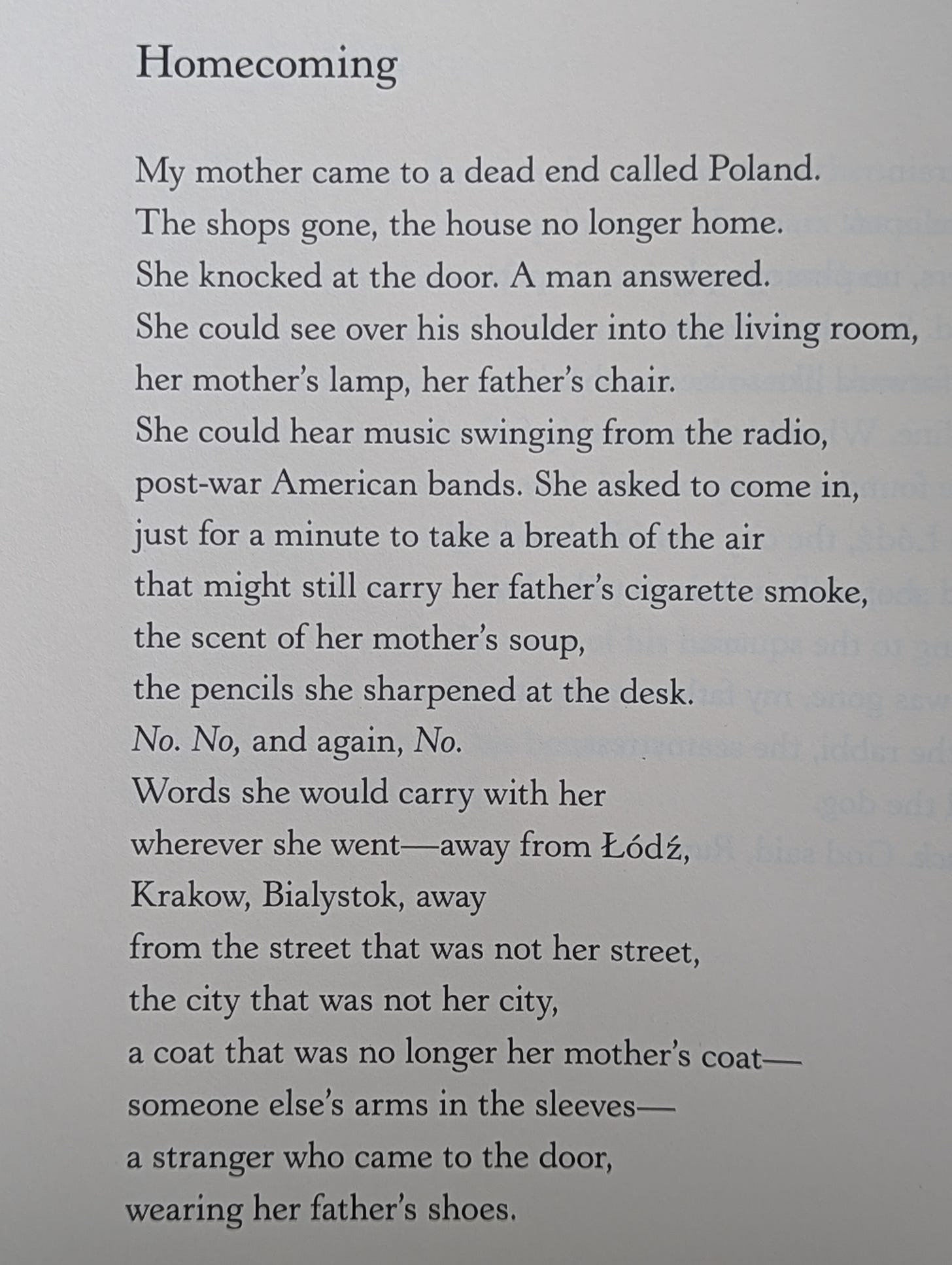

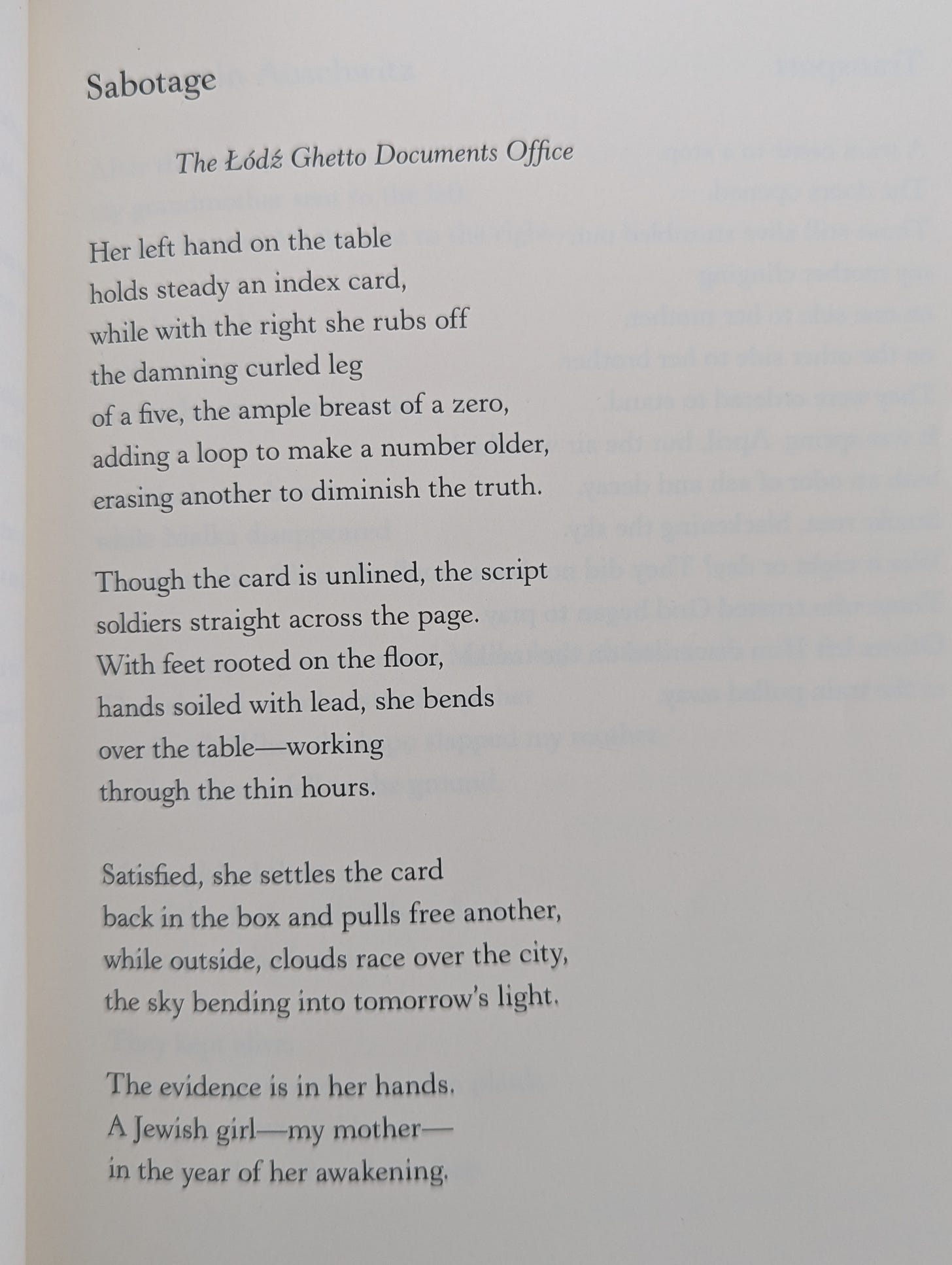
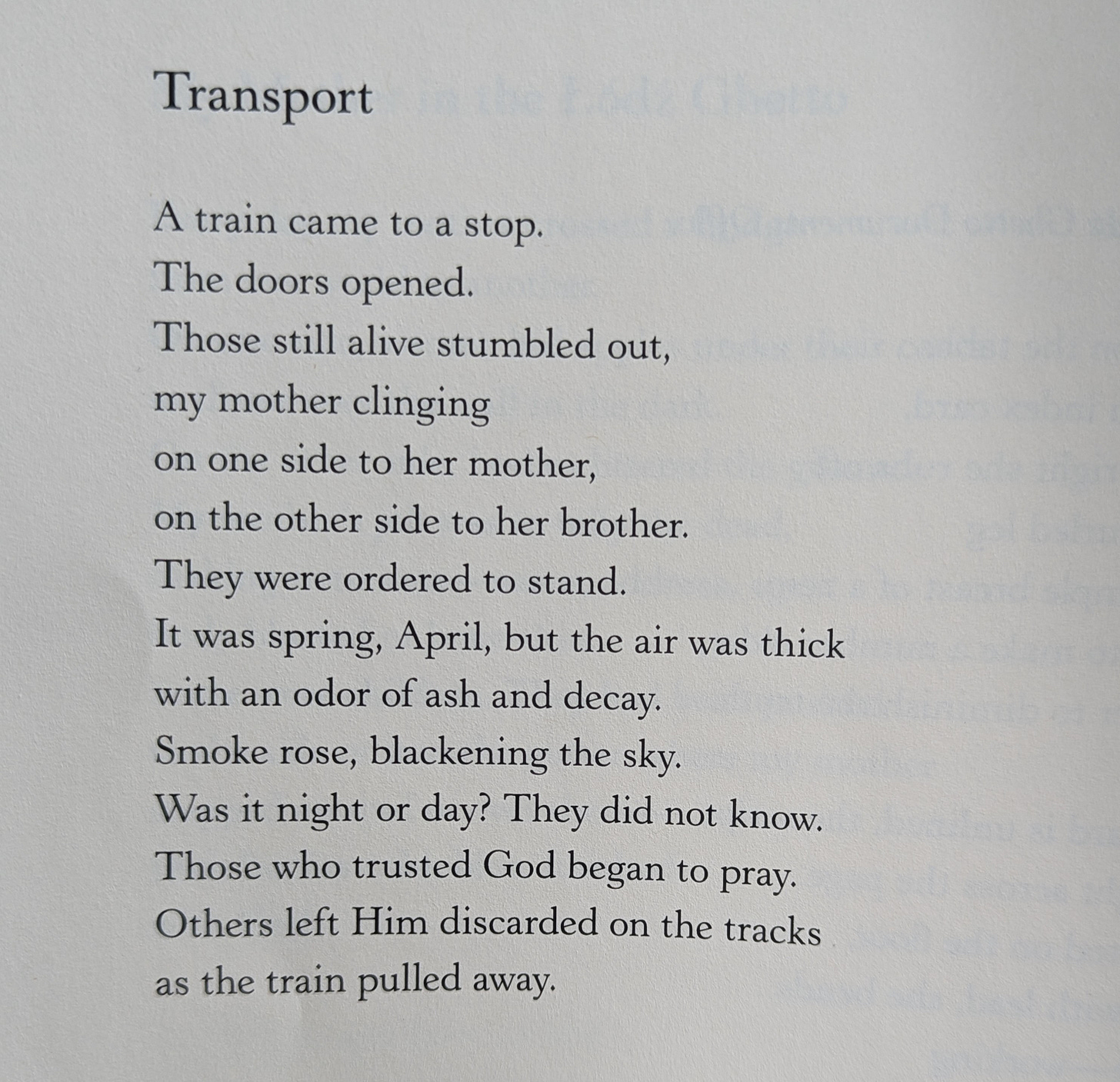
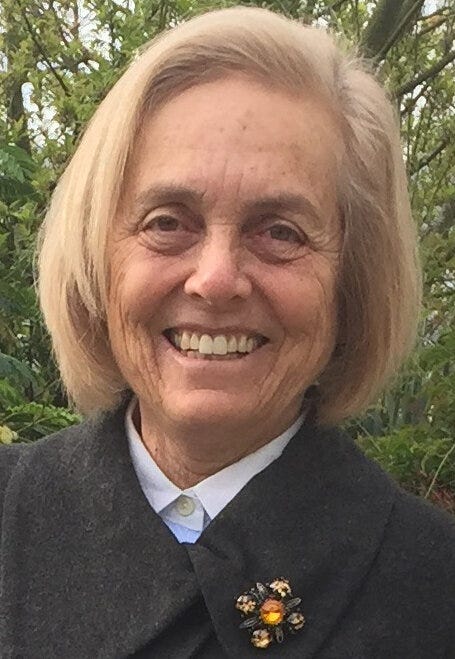
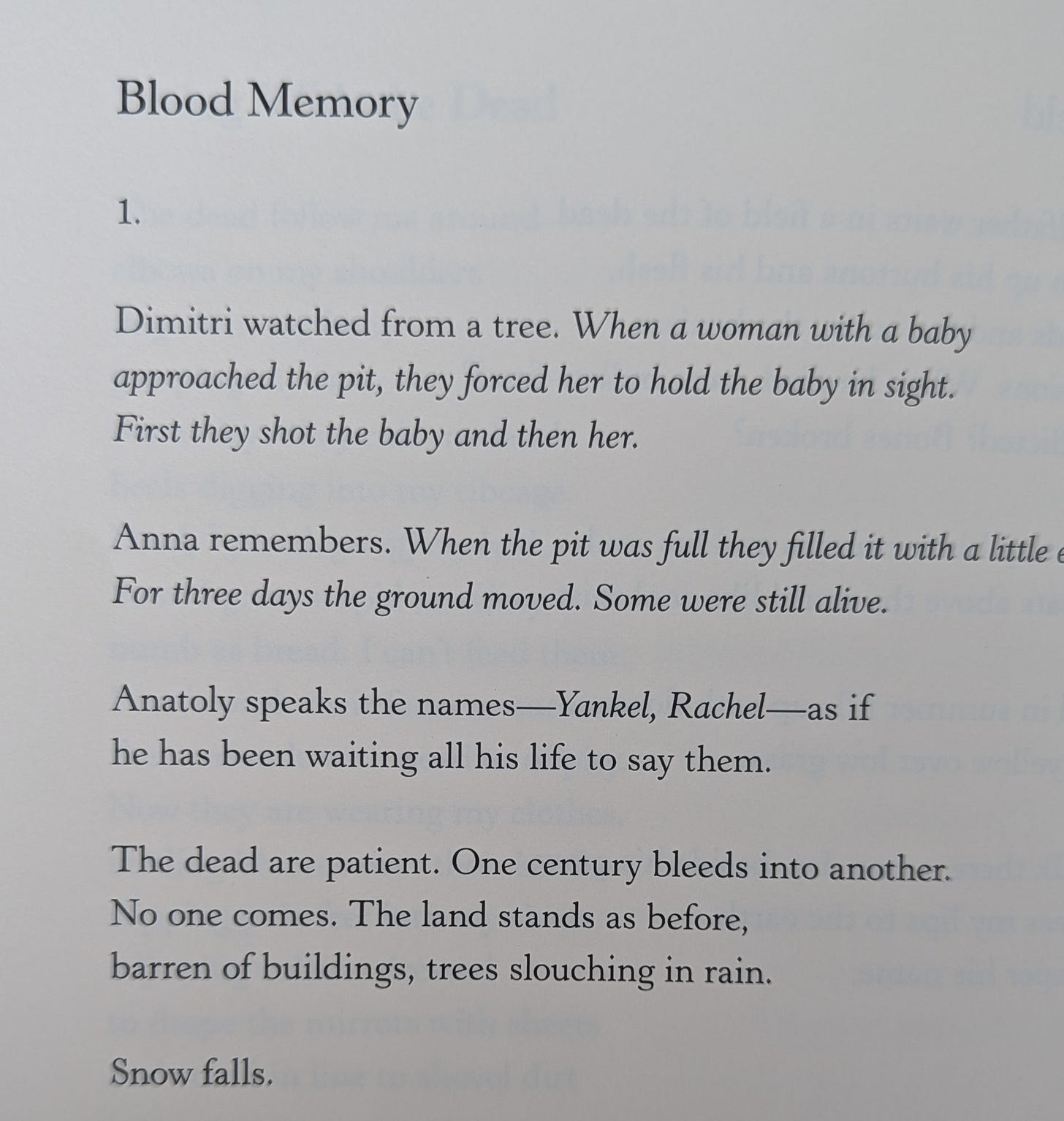

Aviva, Thank you so much for sharing my work. This is truly a time to reflect on the Holocaust and how we can move forward with hope and resilience. I want to let you and readers know that the book is sold out, so I don't think it's available on order at a book store or online.
I have copies that I can provide that are available on my website. I would be glad to provide free postage and signed copies to your readers.
Blessings and warm wishes,
Gail www.gailnewmanpoet. com